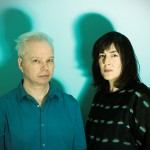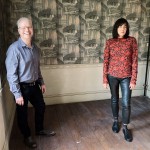
Artist

IMAGES: To download, click above. Photo credit for the top image goes to Trevor Smith. Bottom image is courtesy of the band.
DAMON & NAOMI
20-20-20
On a three-person video-hang one Saturday night in the endless still of pandemic winter, my friend Jenn asked, “Do you want to see the best object I bought this year?”
Of course, said I and my friend Nathan, who had just finished showing us the new framed drawings of Hank Williams and Townes Van Zandt he’d hung above his kitchen table, for company. (Perhaps dour, but definitely interesting company, we agreed.) Jenn disappeared from the frame for a moment and returned with a large hourglass. Purchased, she told us, from the exquisitely named website JustHourglasses.com. Everyone I knew seemed to have developed their own private and somewhat idiosyncratic rituals to get themselves through the year, and this hourglass had become part of Jenn’s: Around 9 or 10 each night, she’d turn her phone off, flip the hourglass, and read until it ran out of sand, at which point she would declare it, however imprecisely but entirely correctly, bedtime.
A few months earlier—or was it longer than that?—I’d made a fortuitous typo that ended up stuck in my mind: quarantime. We needed new words to describe the strange experience of temporality in the time of a global pandemic. Time felt different—not necessarily slower or faster, but more viscous, somehow, like something you could reach out and touch. After Jenn’s hourglass conversation, I started noticing the few that I had amassed in my apartment over the years—forgotten trinkets scattered across various shelves, collecting dust, unflipped for who knows how long. One day I turned over a 15-minute one, timing nothing in particular. When I checked back in on it quite a while later, there was still some rose-colored sand in the top part, which I knew couldn’t be quite right. 15 minutes had surely passed. Had it? I inspected it more closely and saw that some of the sand had gotten stuck in the hole, probably gummed together after so much stillness. I shook it vigorously and the sand started moving again, at a clip that suddenly seemed much too fast. That. The dizzying interplay of those two extremes. That was quarantime.
Jenn had her hourglass ritual to ground her during our long season without time. And Damon and Naomi had the BBC Shipping Forecast, a nightly broadcast from an ocean away that they started listening to each evening during the pandemic, partially to reorient themselves in both time and space. “The broadcast is literal armchair traveling, because they’re taking you around all these small towns of Britain,” Damon said, on our own 3-person video-hang at the end of a more optimistic spring. “During the pandemic, we were listening to it every night,” Naomi added. “It was very comforting, and just kind of hearing all those place names reminded me of the world outside, the world outside of ourselves that we used to have access to.”
With its meditative tempos and enveloping guitar work by Michio Kurihara—“it’s like this golden net,” Naomi said of his gorgeous, versatile playing—A Sky Record offers shelter from the squall. If it has the glow of a long-delayed reunion between friends, that’s not accidental: Kurihara hasn’t traveled outside of Japan in some time, so Damon and Naomi hadn’t recorded with him in nearly ten years. When they finally made it back to Japan in November 2019 for a brief tour, they were elated to book some time with Kurihara at the aptly named studio Peace Music. “It was, for the three of us, really, really emotional,” Naomi said. “Like, yes! We’re able to play together again!” Little did they know it would be their last voyage anywhere for quite some time.
Speaking of time (were we ever not?) another little digression about it: When Damon and Naomi first started playing as a duo in the early 90s, they had to figure out how a two-person band could keep time enough to demo their basic tracks. At first they tried to be just a rhythm section, but that didn’t work: “We couldn’t just put down bass and drums, it was like, where’s the song?” Naomi recalls. “It was impossible.” But with Damon switching to acoustic guitar and Naomi learning keyboard, they found they could more easily harmonize, and, with practice, stay in rhythm. And so to enter a Damon and Naomi song—whether as a trusted collaborator like Kurihara, or a listener—is to become a new occupant of an intimate, two-person time zone that they’ve created for themselves.
In those long stretches of quarantime, the tracks they returned from Japan with had distinct moods but not yet any lyrics. (Kurihara works best when trying to conjure a specific feeling or natural image—after all, he did once make a solo record, Sunset Notes, on which every song was based on a different sunset he’d witnessed—and Naomi was happy to help: “This song’s about early morning, but there’s a little fog, but plants on the ground shining with some cold dew….”) How to write about the pandemic? How to not write about the pandemic? Naomi first struck upon the appropriate tone when re-reading the journals of one of her favorite abstract painters, Charles Burchfield. She arranged this found language into the lyrics of the iridescent “Season Without Time,” which also became a tribute to a friend that she and Damon had lost in the last year. “As I was writing,” she said, “I felt like this was what I could give to them that I thought would have meaning, and that was a song.”
From there, the floodgates opened. The wistful and watery “Midnight” (electrified, towards the end, by the slow screams of a Kurihara solo) conjures Naomi’s nostalgia for youthful summers spent at Jones Beach, while the gentle current of “Sailing By” pays homage to those ritualistic BBC Shipping Forecasts and the waltzing, quintessentially British theme song from which it takes its name.
“Has the storm truly passed?” Naomi sings with relatable apprehension on “The Aftertime.” “Is it morning at last?” We wondered the same thing from our respective video screens that spring morning, hopeful if a little wary that life was once again speeding up too quickly—an omniscient hand suddenly shaking the stopped-up hourglass. None of us wanted to romanticize a time that had been marked by such widespread loss and enduring grief. But we had to admit there were lessons from the past year we wanted to retain, artifacts we wanted to keep with us.
So here is A Sky Record, a lasting document of those slow days that moved like an unperturbed ocean, “a meditative space,” as Damon and Naomi call it, to crawl inside whenever it once again seems like the current is moving too quickly. For what is a record—even a digital one—if not an hourglass that makes sound? Flip it over and see.
— Lindsay Zoladz


